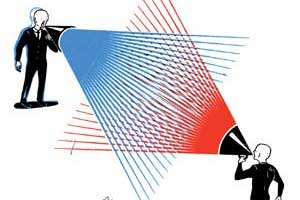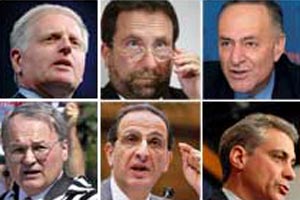Since Barack Obama took office in January, his administration has been plagued by a number of contentious controversies. From the economic stimulus to health care reform, Obama has had trouble maintaining support among liberals and conservatives alike. But the president’s most consistent critics have been Jewish moderates and conservatives worried that Obama is more likely to challenge Israel than past presidents have been.
But surging to power with the most impressive following since Ronald Reagan, Obama is well positioned to challenge the Israel Lobby’s hard-line stalwart, the American Israel Public Affairs Committee (AIPAC). In his latest Mother Jones contribution, “Is AIPAC Still the Chosen One?” Robert Dreyfuss attributes the dwindling power of one of DC’s most powerful lobbies to the popular new president and the recent rise of dovish advocacy groups such as J Street and Israel Policy Forum.
Emphasizing the growing influence of lefty pro-Israel groups, IPF’s Washington Director M.J. Rosenberg recently announced that he would leave to join media watchdog website Media Matters as a Senior Fellow on Foreign Policy. In a statement announcing the move, Rosenberg wrote, “with Media Matters joining this fight, we can help progressives of all stripes understand that supporting occupation and settlements (or wars with various regional players) is antithetical to a progressive world view and, most important, is bad for America.”
AIPAC’s waning clout was underscored this past spring, when Rep. Howard Berman, chair of the House foreign affairs committee, stalled one of AIPAC’s babies, the Iran Refined Petroleum Sanctions Act. Why would this reliably pro-Israel California Democrat go against the AIPAC hegemony? Dreyfuss explains:
The first explanation is obvious: Like many Democrats, Berman is reluctant to stand in the way of President Obama’s foreign policy objectives, including his overture to Iran and his push for US leadership toward an Israeli-Palestinian accord. But Berman’s action also signaled a deterioration of AIPAC’s power. It’s begun to appear that “AIPAC is not the 800-pound gorilla everyone says they are,” says Dan Fleshler, author of Transforming America’s Israel Lobby. “They may be just a 400-pound gorilla.”
Read the story for more on AIPAC in the age of Obama. As the administration continues to push for a solution to the Arab-Israeli conflict, it will be interesting (to say the least) to see how the myriad pro-Israel organizations and their leaders react. Either way, the right wing of the Israel advocacy universe may wield far less control over America’s Middle East policy than it did during Israel’s own long march toward statehood.
















